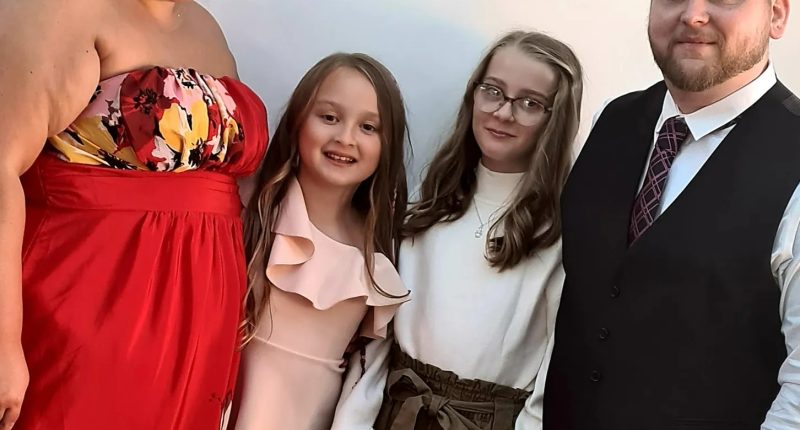MUM-OF-TWO Charlotte Birkenhead was constantly in tears and felt like a recluse in her own home due to spiralling debts.
The 37 year-old who lives in Poulton, Lancashire, with her husband, Alan and their two daughters, Amelia, 15 and Macie, 12, turned her finances around thanks to a tool that has revolutionised her mindset around money.
The couple have built up a healthy savings pot coming back from financial despair.
Around the time their second daughter was born, NHS worker Charlotte and her husband found themselves dipping into the red.
Charlotte told The Sun: “At that time, neither of us were particularly good with money. We didn’t have the right mindset and were living beyond our means.”
Over time, the money owed spiralled out of control.
Read more on debt
“The cards had all been on 0% deals to begin with,” Charlotte said. “But when the introductory periods ended, the costs shot up. I stopped being able to clear any of the outstanding debt when I only made the minimum payments each month. I then ended up borrowing money from family members in a bid to try to make ends meet.”
Charlotte adds: “I knew things had become really bad when I started using my credit card to pay for the weekly food shop.”
Owing thousands of pounds on credit cards – as well as to loved ones – took its toll on Charlotte’s mental health.
“I got very low and was crying all the time,” she said. “I hated always having to say ‘no’ when I got invited to events by family and friends. I felt like a recluse in my own home.”
Most read in Money
Being in debt made both Charlotte and Alan miserable.
“We were in a kind of black hole together,” said Charlotte. “On some occasions, we were faced with the choice of either being able to feed the kids or pay the gas bill. It was just awful. We couldn’t see a way out.”
FACING FACTS
Worried that she was using credit to pay for essentials, Charlotte knew that something had to change.
She sat down with her mum to face facts.
“Mum told me straight out that I was over-spending,” she said.
“She explained in black and white that I simply wasn’t earning enough to cover the cost of things I was paying for.
“I knew things couldn’t carry on as they were.”
At around the same time in 2018, Charlotte read about a credit union called Clevr Money in an NHS staff newsletter.
“For me, Clevr Money has been a godsend,” she said. “Not only has it changed my mindset around money, it’s also enabled me to save and manage my money in a way that keeps the family looked after.
“I just wish I’d found it sooner.”
With a refreshed attitude, Charlotte and partner Alan decided to turn things around.
The couple had a total debt of £5,000 and contacted free charity Citizens Advice Bureau which advised the best course of action was to make agreements with all the creditors.
Charlotte contacted them directly with a draft letter from the Citizens Advice and came to a manageable affordable amount to pay back each month.
In total she pays £50 a month split to Santander and Barclaycard. She had also been paying £50 a month to a family member who loaned her money, but this has now been paid off.
Annually, Charlotte contacts the creditors to recalculate the income and expenditure forms. If she has any extra cash, she’ll use this to make one-off payments to them.
IN CONTROL
Charlotte also set up a savings scheme through Clevr Money, initially putting away around £20 a month.
Even though she still owed money, Charlotte says that saving at the same time rather than using the money to repay debts helps her mental health.
She adds: “We were able to find the happy medium between living, saving and clearing debt.”
The Clevr Money payroll scheme means a certain amount of money is taken out of her wages each month and put into a savings account with the credit union before she receives her pay packet (meaning it’s before tax and National Insurance are taken out).
Having the payroll scheme in place means Charlotte now saves throughout the year.
“This gives me a float which is a real help,” she said.
Having a rainy day fund in place, even when you have debt, can help prevent turning to forms of high-cost borrowing in an emergency.
However, it’s a good idea to prioritise paying off debts that have serious repercussions
Head of communications at debt charity StepChange, Simon Trevethick, said: “Different types of debts carry different levels of priority when it comes to repayment.
“Debts like your mortgage, rent, council tax and utility bills are always the ones you should address first as not paying these can have serious consequences.
“For credit cards and other forms of borrowing like loans or overdrafts, it is crucial to ensure you are paying the minimum repayments each month and are looking to pay down the accounts with the highest rate of interest the quickest.”
If you’re struggling with debt repayments and are worried about which to prioritise then the best piece of advice is to seek help from a free and impartial debt advice charity such as StepChange.
BOOSTING SAVINGS
Nowadays Charlotte, says she stops and ask herself whether she really need to go shopping.
She adds: “Or I might think about whether the girls can wait a few more weeks before needing new school shoes.
“I don’t have an overdraft, so if I don’t have cash in the bank, the item simply doesn’t get bought. Our focus is on living within our means.”
Credit union ClverMoney has also helped in other ways.
In the winter 2021 before, a string of appliances at home broke down in quick succession.
“My hoover broke, my fridge-freezer failed, and I needed to replace all four tyres on my car.”
Happily, when Charlotte messaged the credit union, she was offered a Family Loan.
“This is a one-off payment of £500 which you pay back by directing your child benefit money into your savings account,” she said.
“Over time, this is then used to clear the loan. Helpfully, no credit checking is required to get accepted.”
As Charlotte gradually got used to living without the child benefit payments, she carried on saving this money each month – even once she’d paid off that first Family Loan.
The savvy mum now squirrels a healthy £200 a month into the payroll scheme. This has enabled her to amass around £2,000 in savings in less than a year.
Charlotte said: “With a baby on the way, that’s our current savings goal. The good news is, having got into good habits, we’ve worked out that I’ll be able to take a whole year off for maternity leave.”
Since making agreements with her creditors, she’s been able to reduce her debts, too.
“My debts are now under control and no longer a worry,” she said. “I’m no longer fearful of bailiffs knocking at the door. My repayments are just another bill that comes out of the account. I hope it won’t be too long before I’m debt-free.”
Over the past 10 years or so, life has changed in lots of ways for the couple.
“Back when we were struggling with debt, not being in control of our finances put a lot of strain on our marriage,” said Charlotte. “Both Alan and I felt that the life we were leading was not the life we intended.”
READ MORE SUN STORIES
Things look a lot rosier now.
“Right now, Alan and I lead a completely different life,” she added. “Without Clevr Money, we wouldn’t be able to have the life we have as a family.”
How to get free debt help
THERE are several groups which can help you with your problem debts for free.
- Citizens Advice – 0800 144 8848 (England) 0800 702 2020 (Wales)
- StepChange – 0800138 1111
- National Debtline – 0808 808 4000
- Debt Advice Foundation – 0800 043 4050
You can also find information about Debt Management Plans (DMP) and Individual Voluntary Agreements (IVA) by visiting MoneyHelper.org.uk or Gov.UK.
Speak to one of these organisations – don’t be tempted to use a claims management firm.
They say they can write-off lots of your debt in return for a large upfront fee.
But there are other options where you don’t need to pay.
How to get free debt help
THERE are several groups which can help you with your problem debts for free.
- Citizens Advice – 0800 144 8848 (England) 0800 702 2020 (Wales)
- StepChange – 0800138 1111
- National Debtline – 0808 808 4000
- Debt Advice Foundation – 0800 043 4050
You can also find information about Debt Management Plans (DMP) and Individual Voluntary Agreements (IVA) by visiting MoneyHelper.org.uk or Gov.UK.
Speak to one of these organisations – don’t be tempted to use a claims management firm.
They say they can write-off lots of your debt in return for a large upfront fee.
But there are other options where you don’t need to pay.










